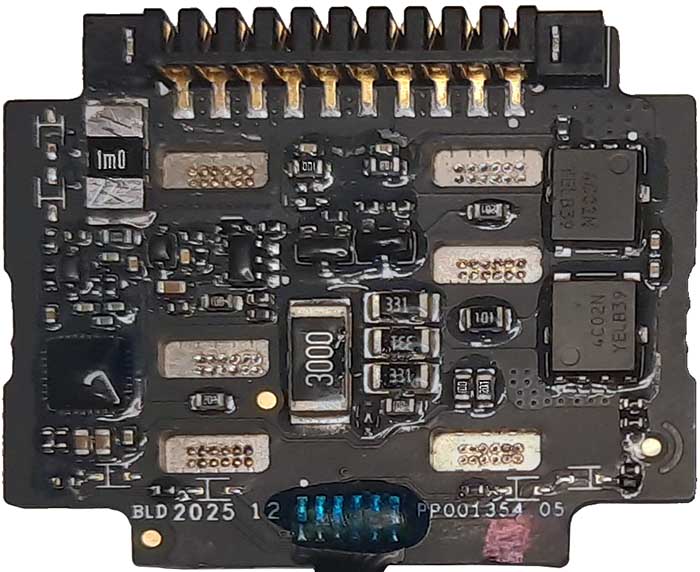-
Notifications
You must be signed in to change notification settings - Fork 427
WM231 Battery Intelligent Board
Function
Variants
Parts
Programming
External interfaces
Service interfaces
Board view
Schematics
TODO
DJI Intelligent Flight Battery for Mavic Air 2 and Air 2s is a 3500mAh, 11.55V LiPo-3s battery, supporting up to 34 minutes of flight time. The battery also has built-in sensors and LEDs which let you know the status and remaining power. It contains automatic discharge feature to avoid swelling (fully charged LiPo cells release hydrogen), and Permanent Failure feature which disables the battery in case of damage or unexpected behavior of cells.
The battery management system chip (TI BQ9003) communicates with FC directly, through Smart Battery System protocol, with some small modifications introduced by DJI.
The SBS protocol defines battery-related commands to be transferred over SMBus, which in turn is deviced from I2C.
There are multiple versions of the board.
| Marking | Overview |
|---|---|
| PP001354.05 |
| Marking | Amt. | Pkg. | Function | Specification |
|---|---|---|---|---|
| BQ9003 | 1 | TSSOP-30 | Li-Ion Battery Pack Manager; the specific chip was only made available by TI for a few customers, but it is relatively similar to BQ40Z50. The DJI-modified firmware presents the chip as BQ40z307. |
| Chips | Firmware | Description |
|---|---|---|
| BQ9003 | m1100 | Battery Management System chip firmware. |
Connectors on the board are:
| Marking | Overview |
|---|---|
| TODO |
The following service pads exist on this board:
| Marking | Overview |
|---|---|
| TODO |
Top of a PP001354.05 board:
flowchart LR
Connector-BAT((batt<br/>connec<br/>tor))
subgraph Battery Intelligent board
direction LR
BatteryBMS[BQ9003 BMS<br/>Li-Ion pack<br/>manager]
BattFeedbackR(0.01 Ohm<br/>feedback<br/>resistor)
EnablePackFET(MOSFET<br/>output<br/>control)
EnableChargeFET(MOSFET<br/>charge<br/>enable)
EnableDischargeFET(MOSFET<br/>internal<br/>discharge<br/>enable)
DischargeR(discharge<br/>resistor)
BatteryButton(button)
BatteryLEDs(LED line)
DischargeR---EnableDischargeFET
BatteryBMS-- DSG ---EnableDischargeFET
BatteryBMS-- PCHG ---EnablePackFET
BatteryBMS-- CHG ---EnableChargeFET
BatteryButton---BatteryBMS
BatteryLEDs---BatteryBMS
end
subgraph Li-Po cells pack
direction TB
BatteryCell1(battery<br/>cell 1)
BatteryCell2(battery<br/>cell 2)
BatteryCell3(battery<br/>cell 3)
BatteryTempSense(NTC<br/>thermistor)
BatteryCell1===BatteryCell2
BatteryCell3===BatteryCell2
end
BattFeedbackR===BatteryCell1
BatteryBMS-- VSS ---BatteryCell1
BatteryBMS---BatteryCell2
BatteryBMS---BatteryCell3
Connector-BAT== PACK- ===BattFeedbackR
BatteryBMS-- SRn ---BattFeedbackR
BatteryBMS-- TS ---BatteryTempSense
EnableDischargeFET===BatteryCell3
EnablePackFET===EnableDischargeFET
EnableChargeFET===EnableDischargeFET
Connector-BAT== PACK+ ====EnablePackFET
Connector-BAT== PACK+ ====EnableChargeFET
Connector-BAT-- SMBus ----BatteryBMS
Thick lines are the ones transferring high power. Feedback resistor for measuring current is inserted into negative line, while all the MOSFET switches are within positive line. The three Li-Po cells are connected in series, so that the voltage sums up.
The output connector includes SMBus lines from the Battery Management System chip, which allow to exchange packets described in Smart Battery Specification, as well as some DJI-specific extensions.
The charge level, as well as errors and faults detected within the BMS, can be shown on four LEDs. Specifics of how the interface and the buttons work, as well as extensions to the SBS protocol, require implementation within the BMS firmware. Therefore, the firmware is not a stock TI version, but a modification of TIs firmware code by DJI engineers.
No schematics available.
This page is created by drone enthusiasts for drone enthusiasts.
If you see a mistake, or you know more about specific subject, or you see an area for improvement for the wiki - create an issue in this project and attach your patch (or describe the change you propose).
